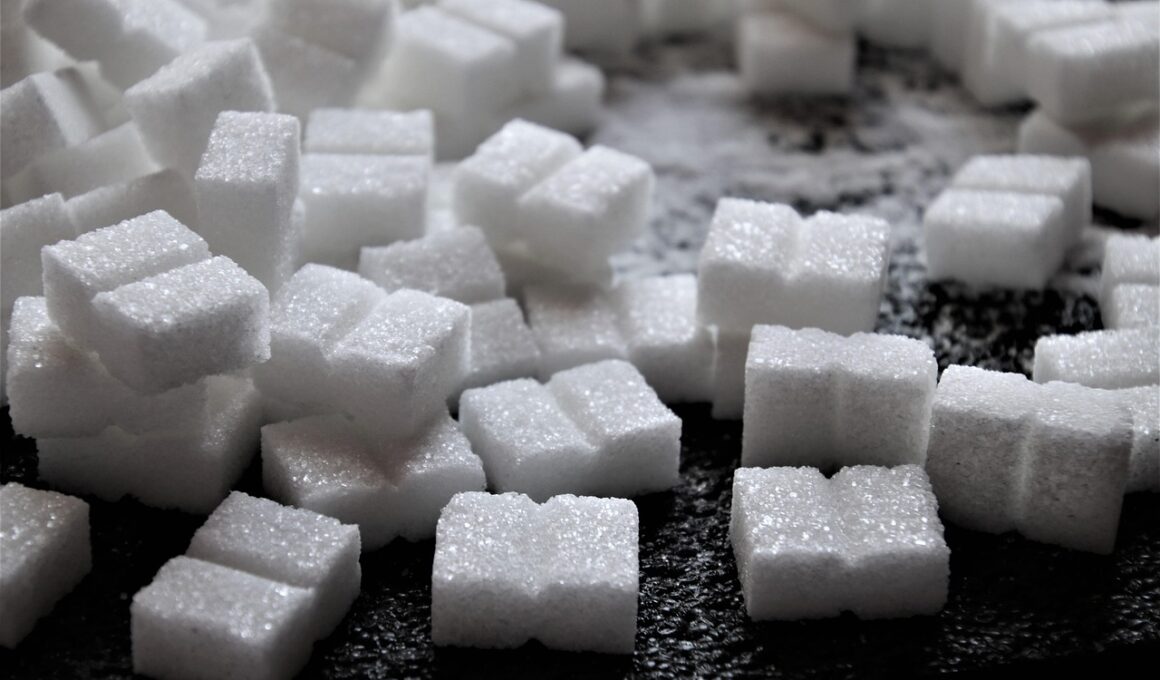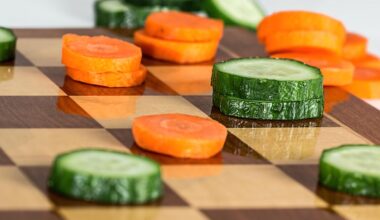Hidden Sugars in Everyday Foods
Many people are unaware that sugar is a common ingredient in staple foods. Often hidden, these sugars can lead to increased health issues. These hidden sugars contribute to weight gain, increased cravings, and various metabolic problems. Foods like sauces, dressings, and canned products frequently contain added sugars. For example, products like ketchup and barbecue sauce contain sugar to enhance flavor. Therefore, reading food labels is crucial. It’s important to identify products with high sugar content. Additionally, even healthier options can have significant sugar levels. Yogurts marketed as healthy often contain added sugars to improve taste. Granola bars, despite their wholesome image, can also have notable sugar amounts listed in their ingredients. Looking at the nutritional information can be an eye-opener. The daily recommended sugar intake should not be surpassed to maintain overall health and prevent chronic diseases. To limit sugar intake, consider cooking sauces and dishes at home. By controlling the ingredients, you can make healthier choices. Moreover, opting for whole foods can also reduce exposure to hidden sugars. Choosing fresh vegetables and fruits will help diminish reliance on processed foods.
The Types of Hidden Sugars
Hidden sugars come in various forms, making them difficult to identify. Understanding these types can provide better insight into managing dietary choices. Common terms such as sucrose, fructose, and glucose often appear on ingredient lists. Each term refers to different sugar sources that contribute equally to total sugar intake. High-fructose corn syrup is another prevalent type used in many processed foods. Often, consumers are misled about food healthiness based on their ingredient lists. For instance, a ‘fruit-flavored’ product may contain little actual fruit, mainly relying on added sugars. The deception often lies in the marketing, suggesting these foods are healthier than they are. Moreover, natural sweeteners like honey or agave also contribute sugar but are marketed as better alternatives. Be cautious when these are present as well. Reading labels thoroughly is essential to determine added sugars. It’s also possible to avoid consuming unnecessary sugars through educated choices. Making this informed decision helps keep sugar intake within recommended limits. Additionally, the impact of artificial sweeteners needs consideration. They may not be as harmless as advertised and could inadvertently lead to sugar cravings.
Breakfast cereals also often contain hidden sugars. Many people unknowingly consume high-sugar breakfast options in the morning. These cereals, marketed towards children or as healthy, can contain excessive amounts of sugar. For example, ones marketed as whole-grain can still be high in sweeteners. Checking labels can often reveal shocking sugar levels. A misleading classification might label a cereal as healthy despite possessing sugar content above the recommended limits. Granola options may resemble healthier choices but typically carry high sugar as well. Fresh fruit can serve as a better alternative for sweetening breakfast without excess sugar. Overall, focusing on whole and unprocessed foods can prevent intake problems. Furthermore, many packaged snacks often feature hidden sugars. These sugary snacks lead to increased caloric consumption without providing real sustenance. Even savory snacks, like flavored chips, could contain sugar to enhance taste. Opting for healthier homemade alternatives ensures better control of ingredients. Preparation at home allows one to limit hidden sugars in their diet. It’s important to be diligent about remaining aware of sugar contents in everyday foods to maintain a healthier lifestyle and avoid future health issues.
In addition to common foods, beverages can harbor significant sugars. Many people overlook the sugars present in drinks like soda, flavored teas, or even so-called health smoothies. Soda is often packed with sugars that contribute to daily limits being exceeded quickly. For example, a single soda can contain around 40 grams of sugar. Additionally, sweetened coffee drinks can also often surprise with their sugar content. Smoothies and fruit juices marketed as health choices often contain more sugar than whole fruits. Many brands add sugar during processing to make beverages taste better. Evaluating drink options can make a considerable difference in daily nutrition. Choosing water or tea can limit sugar intake effectively. Moreover, even protein shakes can conceal added sugar for flavor enhancement. Examining these labels closely helps to grasp total sugar contributions to your diet. Hydration doesn’t have to involve high sugar beverages. Natural alternatives exist to hydrate while minimizing sugar consumption. Switching to flavored water infusions or unsweetened teas can maintain flavor without added sugars. This practice falls in line with embracing whole nutritional choices through dietary adjustments.
Alternatives to Manage Sugar Intake
Fortunately, there are numerous alternatives to manage sugar intake effectively. Numerous sweeteners offer options for those looking to reduce sugar consumption without sacrificing flavor. Natural sweeteners like stevia and monk fruit provide these opportunities. Both of them have lower caloric content compared to regular sugar. Luckily, they are also naturally occurring and can be found in various products. Many brands now offer snacks and desserts made with these alternatives. Consumers should consider switching to these options to maintain satisfaction. Furthermore, learning how to adjust recipes using natural substitutes presents added advantages. Homemade versions can utilize mashed bananas or applesauce as sweetening alternatives. These substitutions not only lower sugar consumption but also add nutritional value. Additionally, sugar-free versions of many favorite products now exist. However, it’s essential to still read labels to ensure healthiness. Some sugar-free products may contain artificial ingredients that aren’t beneficial. Healthier lifestyle choices are possible with informed food decisions, and a balanced approach can help see changes greatly. Adopting these alternatives over time benefits both overall health and long-term wellness.
Adopting healthier lifestyle habits requires consistent effort and awareness of hidden sugars. It is essential to develop habits that help minimize sugar intake. Preparing meals at home is one effective strategy that involves fewer hidden sugars. This approach allows complete control over the ingredients used in each dish. Additionally, seeking out whole, unprocessed foods has a significant impact on nutrition quality. Store-bought products can often be misleading, prompting individuals to turn to healthier food sources. Engaging with local farmers’ markets or bulk food stores could yield lesser processed options with fewer additives, including sugar. Educating oneself about food sources contributes to improved decision-making. Furthermore, engaging family members in the process could result in raising awareness about hidden sugars. Informing oneself about beneficial choices increases motivation to maintain nutritional health. Ultimately, our diet shapes our overall well-being. Making the necessary adjustments can have long-term benefits on health. Balancing indulgences with healthy eating patterns is vital. Striking this balance encourages satisfaction without losing the enjoyment of food. Ultimately, being aware and mindful can establish lasting, healthier habits around sugar consumption.
In conclusion, understanding the hidden sugars in everyday foods is crucial. Becoming informed and conscious about food choices can greatly affect health outcomes. Identifying hidden sugars helps to make better dietary decisions. It’s essential to read product labels, recognize various sugar forms, and be aware of marketing tactics. Many everyday foods and drinks contain added sugars, sometimes exceeding daily recommendations. Awareness of the impact of these hidden sugars fosters healthier eating habits. Choosing to prepare meals at home contributes to reduced sugar exposure, allowing better control over nutrition. Making dietary adjustments to incorporate natural sweeteners creates healthier alternatives. With commitment and consistency, it is possible to manage sugar intake more effectively. Additionally, seeking external sources such as nutritionists or dietitians can provide further guidance. Discussions regarding the significance of sugar awareness are paramount in driving lifestyle changes. These changes can significantly have beneficial effects on overall wellness and health. Making informed joyful choices while eating should be the goal. Ultimately, striving for better nutrition touches every aspect of life and enhances overall quality.
Making informed dietary changes impacts various aspects of health and wellness. It is essential to recognize the importance of sugar awareness in daily nutrition for overall well-being. By incorporating knowledge of hidden sugars, individuals will foster robustness and energy. Ultimately, the aim is to maintain sustained health and vitality throughout life.


